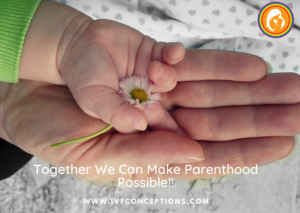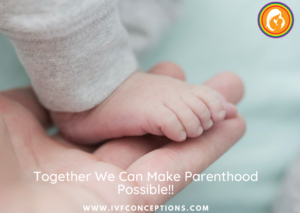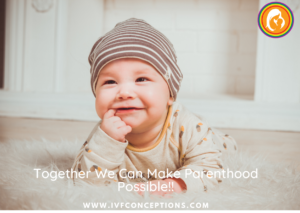How to conceive twins via IVF and surrogacy?

While there are no proven actions that guarantee conceiving twins, certain factors can make it more likely. In this article, we will explore these factors, including age, family history, and fertility treatments. By understanding these influences and making informed choices, you can maximize your odds of having twins and learn more about how to conceive twins.
The news of having a set of twins makes the intended parents excited and nervous at the same time. While the chances of conceiving twins are not confirmed, certain factors may make this form of pregnancy more likely. Although the common understanding is that having twins is double happiness, multiple pregnancies have their own risks. In this article, we will see how to conceive twins and if it should be desired or not.
Fertility therapies such as Clomid, Follistim, and Gonal-F, make it simpler for you to consider many things, but you can also improve your birth chance to have twins depending on your height, your age, and your family background.
Why Do Twins Happen?
To comprehend how to increase your chances of having twins, it’s essential to understand why twin pregnancies occur. There are two types of twins: identical and nonidentical (fraternal) twins.
Identical twins occur when a single fertilized egg splits into two separate embryos. These embryos, known as monozygotic twins, have identical genes, are the same sex, and bear a striking resemblance to each other.
Nonidentical twins happen when two separate eggs are present in the womb at the time of fertilization, and each egg is fertilized by different sperm. These embryos, called dizygotic twins, do not share identical genes and may not be the same sex.
The science behind conceiving twins
Due to the rising average maternal age and the associated increase in assisted reproductive techniques, in particular fertility drugs, multiple births are more prevalent than in the past. More than 90% of births are accounted for by twins. The twins are the (monozygotic) and fraternal (dizygotic) types.
One fertilized egg (ovum) splits into two babies, who have the same genetic material, to make identical twins or monozygotic. It differs from fraternal twins(dizygotic), which fertilize two sperm and two eggs (ova) and produce two children with different genes.
Causes of Twins Pregnancy -Factors That Increase the Odds of Having Twins
These twins can be born with the help of treatments or without the treatments. It is important to know the conceiving of twins with the help of normal factors.
The factors apart from treatments that cause twin births are –
#1. Family History
A family history of the same twins does not increase the chance of multiples. If you have non-identical twins within your family, however, you will be more likely to conceive twins. If both mom and father have fraternal twins, the chances are even higher for the twins. According to the ASRM, twins are produced in about one woman who is non-identical twins in every 60 births. The chance of twins is only 1 in 125 births for men who are non-identical twins.
#2. Height
Women who have twins are higher than average. In one study, women with an average height of 164.8 cm are more likely to conceive twins than the average of 161.7 cm. It’s not obvious if these findings are because of which reason but one reason can be good nutrition among such females.
#3. Age
Women older than 30 have a higher risk of developing twins due to the rise in the FSH hormone as a woman gets older. FSH is responsible for developing eggs in the ovaries before it is released, or follicle-stimulating hormone. A woman aged requires higher rates of FSH, as eggs need more stimulation than a younger woman. It is somewhat ironic, as increased FSH is often caused by decreased infertility. However, follicles sometimes overact to a higher level of FSH and release two or more eggs, leading to a twin pregnancy.
#4. Weight
Obese women — with a BMI greater than 30 — conceive twins rather than women with a healthier BMI. The situation is ironic as overweight women also harder to conceive.
Extra fat results in higher estrogen levels. The greater estrogen levels can cause ovaries to over-stimulate. The ovaries can release two or more, rather than just one egg during ovulation.
- Diet – While research is still underway, some studies have shown that women who consume more dairy products have a better chance of conceiving doubles. One hypothesis is that cows’ growth hormones influence human hormone levels.
- Breastfeed – Women who conceive of breastfeeding prefer to conceive of doubles rather than women who do not. Indeed, breastfeeding can also prevent and eradicate fertility, particularly when the baby is breastfed solely during the first six months of a baby. Although you will get pregnant when you breastfeed — and the twins!
- Other factors – In women who have had multiple pregnancies and large families, twins are more common. In the meantime, Africans often conceive twins more frequently than Caucasian women and Asian women conceive of twins at least.
#5. Fertility Treatments
Fertility treatments significantly increase the chances of having twins. Different types of fertility treatment can impact the likelihood of conceiving twins:
- Fertility Drugs: Some medications stimulate a woman’s ovaries, potentially leading to the release of more than one egg. If both eggs are fertilized, this can result in twins.
- In Vitro Fertilization (IVF): During IVF, eggs are extracted from the woman’s ovaries and fertilized with sperm in a laboratory. The resulting embryos are then transferred to the woman’s womb. To increase the chances of success, healthcare professionals may implant more than one embryo, which can lead to twin pregnancies if both embryos implant and develop successfully.
 Use of fertility treatments and twins
Use of fertility treatments and twins
The ASRM notes that fertility treatments are the main factor in increasing the likelihood of twins. The different kinds of fertility treatments available are more likely to increase the probability of twins in various ways.
Some fertility medicines can stimulate the ovaries of a female which may sometimes lead to more than one egg being released. When each of these eggs is fertilized by sperm, this will lead to twins.
Health professionals perform IVF by removing women’s eggs and fertilizing them in a laboratory with sperm for the production of an embryo. The fertilized embryo is transferred then to the womb of the woman.
The healthcare provider may insert more than one embryo into the womb, to maximize its chances of success. Twins may happen when both embryos successfully implant and develop.
More than one pregnancy carries additional risk. Thus, the medical practitioner will usually limit the number of embryos that are transferred to the womb to reduce the likelihood of twins.
 How common are twins?
How common are twins?
Twin birth rates in the United States rose over 75% from 1980 to 2009. In the United States, an estimated 3% of pregnant women are carrying twins annually.
Twins happen in roughly 1 out of 250 births, according to the American Society for Reproductive Medicine. In women receiving fertility treatments, the rate is much higher. Approximately 1 in 3 pregnancies with fertility treatment will be twins, according to the American Society for Reproductive Medicine.
Risks associated with twin pregnancies
Twin pregnancies not only carry the joy of growing up two babies but also carries the baggage of risks and complications that may arise out of twin pregnancies.
These risks and complications of twins pregnancy are as follows –
- Cesarean delivery
- Premature birth
- The low weight of the babies
- Diabetes during pregnancy
- Cerebral palsy in the child
- Autism in child
- Preeclampsia
Read more about twins pregnancy in surrogate mother:
Surrogacy twins babies with different fathers
What are the Risks for Surrogates with Twins?
What do You Need to Know About the Costs of Surrogacy with Twins?
 Conclusion
Conclusion
While there are no guaranteed methods to naturally increase your chances of having twins, understanding the factors that contribute to twin pregnancies can empower you to make informed choices. Factors such as age, family history, racial background, and fertility treatments play significant roles.
By prioritizing your health, seeking medical guidance, and embracing patience, you can optimize your chances of having a healthy and successful pregnancy. Remember to consult with healthcare professionals to ensure personalized care and support throughout your journey.
If possible, the aim should be to have a single healthy baby so that the mother and child feel safe and comfortable. Twin pregnancy comes with inherent risks like a 65% chance of cognitive or physical abnormality.
But if you have conceived twins, make sure to follow the doctor’s instructions and go for timely scans. Planning the thing ahead might be good as most of the twin’s delivery is pre-mature.
If you’d like to learn more about IVF, Egg Donation, or surrogacy services globally, check out the rest of our website: IVF Conceptions. We offer legally secure and affordable surrogacy consulting services for FREE.

FAQs for How to Conceive Twins?
Can you naturally increase your chances of having twins?
Yes, certain factors may increase your chances of having twins naturally.
These factors include genetics, age, height, weight, and family history. Identical twins occur when a single fertilized egg divides into two, while fraternal twins result from the fertilization of two separate eggs by two separate sperm cells.
The chances of having identical twins are relatively rare, around 3 or 4 in every 1,000 births.
What are the factors that contribute to conceiving twins?
Several factors contribute to conceiving twins, including
- genetics,
- age,
- height,
- weight, and the use of fertility treatments.
Genetic factors play a significant role, with a family history of twins increasing the chances of having twins.
Is there a specific diet that can increase the likelihood of conceiving twins?
There is no specific diet that has been scientifically proven to increase the likelihood of conceiving twins. While certain factors like age, genetics, and weight can influence the chances of having twins, there is no conclusive evidence that specific foods or diets can increase the likelihood.
Are there any medical procedures that can help with conceiving twins?
Yes, certain medical procedures can help with conceiving twins. Fertility treatments, such as the use of fertility drugs or in vitro fertilization (IVF), can increase the chances of having twins.
Fertility drugs stimulate the ovaries to release multiple eggs, increasing the likelihood of fertilization and subsequent twin pregnancies.
Is there a genetic predisposition to conceiving twins?
Yes, there is a genetic predisposition to conceiving twins. Having a family history of twins, especially fraternal twins, increases the chances of conceiving twins.
Can age affect the chances of having twins?
Yes, age can affect the chances of having twins. Women over the age of 35 have a higher likelihood of conceiving twins compared to younger women.
Do certain ethnicities have a higher likelihood of conceiving twins?
Certain ethnicities have been associated with a higher likelihood of conceiving twins. Research suggests that African and African-American women have a higher incidence of twinning compared to other ethnic groups.
On the other hand, Asian populations have a lower incidence of twinning.
Are there any supplements that can boost the chances of having twins?
There is no scientific evidence to support the use of supplements as a means to boost the chances of having twins.
While certain supplements may be recommended for overall reproductive health, such as folic acid for pregnant women, there are no specific supplements known to increase the likelihood of conceiving twins.
How does the use of fertility treatments impact the chances of conceiving twins?
The use of fertility treatments significantly increases the chances of conceiving twins. Fertility treatments such as the use of fertility drugs or IVF often involve the stimulation of the ovaries to produce multiple eggs, increasing the likelihood of fertilization and subsequent twin pregnancies.
What are the risks associated with a twin pregnancy?
A twin pregnancy carries certain risks compared to a singleton pregnancy. Some of the risks associated with twin pregnancies include:
- preterm birth,
- low birth weight,
- preeclampsia,
- gestational diabetes,
- anemia, and
- complications during delivery.
The healthcare provider will closely monitor the progress of the pregnancy and provide appropriate care to minimize these risks. It’s important for individuals expecting twins to have regular prenatal care and maintain open communication with their healthcare provider.


 Use of fertility treatments and twins
Use of fertility treatments and twins How common are twins?
How common are twins? Conclusion
Conclusion